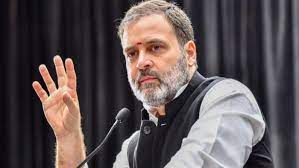


In a speech promoting his ‘Mohabbat ki Dukan’ in the US, Rahul Gandhi spewed venom against Prime Minister Narendra Modi. The speech that seemed more inclined towards self-promotion and discrediting India’s leadership, rather than building a narrative of love as promised by his event ‘Mohabbat ki dukan’, Rahul Gandhi decided to lambast Prime Minister Narendra Modi. But unfortunately, his attempt was viewed by many as an unsavoury blend of sarcasm and unproven allegations.
Speaking to Indian Americans in Santa Clara at the ‘Mohabbat Ki Dukaan’ event, Gandhi ironically chose to forego the theme of love, instead choosing to berate PM Modi, whom he termed a “specimen” who arrogantly believes himself more knowledgeable than God. He contended that this “group of people,” presumably alluding to the current BJP government, was destroying the ‘idea of India’, an accusation which was promptly met with a severe backlash from BJP leaders. They labelled Gandhi as a “fake Gandhi”, who resorts to “anti-India propaganda” abroad.
Gandhi’s off-the-cuff remarks insinuated that PM Modi is so overconfident that he could lecture God about the universe’s workings. Unsurprisingly, this tasteless attempt at humour did little to win him admiration, rather evoking laughter from the audience.
The former Congress president also equated the perceived marginalisation of Muslims in India to the plight of Dalits in Uttar Pradesh during the 1980s. Unveiling his political naivety, he seemed to forget that it was the Congress party that held power both nationally and at the state level during that time.
His accusations didn’t end there. According to him, other minorities such as Sikhs and Christians, along with Dalits and tribals, are being targeted. Information and Broadcasting Minister Anurag Thakur, in response to these baseless allegations, reminded the audience of Gandhi’s track record of belittling India during his trips abroad, thus raising questions about his loyalty towards the nation.
Union Minister for Parliamentary Affairs Pralhad Joshi was quick to dismiss Gandhi’s tirade as the ramblings of a man whose historical knowledge is limited to his family history. Anil Baluni, BJP chief spokesperson and Rajya Sabha member, echoed this sentiment by stating that it’s in the Congress party’s character to conspire against the country. Gandhi also alleged that India’s core idea was under attack, a notion vehemently opposed by senior BJP leaders who lauded India’s progress under PM Modi’s leadership. Sushil Modi, a senior BJP leader, attributed Gandhi’s outburst to his frustration over the Congress party’s diminished role in Indian politics. He also highlighted the success of PM Modi’s ‘sabka saath, sabka vikas’ vision, which has significantly benefited the Muslim community through various welfare schemes.
The former Congress president didn’t shy away from targeting the new parliament building, branding it as a distraction from real issues like unemployment and inflation. However, his criticisms seemed hollow when juxtaposed against the Congress party’s unimpressive track record in power.
While Gandhi might have intended to resonate with his audience through love and unity, he ended up steering the conversation towards negativity and mockery, showcasing his inability to effectively leverage such platforms for constructive dialogue.
As the event continued, Rahul Gandhi’s narrative deviated even further from the supposed theme of unity and love, delving deeper into his critique of PM Modi’s governance. His remarks drew attention to what he perceived as a state of helplessness amongst the poor and minority communities in India under the current BJP government.
However, his words seemed to lack substantive backing. He highlighted the Sengol row but was unable to provide a concrete solution or a viable alternative strategy to address the issues at hand. Instead, he insisted that PM Modi’s government was unable to tackle the problems of unemployment and price rise. He took a jab at the BJP’s new Parliament building project, dismissing it as a distraction from these more pressing matters.
Gandhi’s comment about being “happy that I’m not lying down” seemed to be a misplaced attempt at self-praise, further undermining his credibility in the eyes of his audience. In a seemingly misguided effort to discuss India’s pressing issues, his rhetoric remained significantly skewed towards ridicule and criticism, rather than providing thoughtful and constructive ideas.
This anti-Modi rhetoric also received strong pushback from the BJP. Anurag Thakur, one of the BJP leaders, reminded Gandhi that the scenarios he complained about were prominent when the Congress was in power. He pointedly asked, “Who was the prime minister when Sikhs were killed in 1984?”, thereby challenging Gandhi’s allegations of minority persecution under BJP rule.
The BJP’s fierce defence and counter-criticism did not deter the Congress from supporting Gandhi. Despite the heavy critique and mockery of Gandhi’s comments, the party, through its general secretary Jairam Ramesh, insisted that the real issues affecting the people were unemployment, soaring price rise, and the spread of hatred. Ramesh claimed that the ‘Bharat Jodo Yatra’ was a transformational movement, resonating with millions of Indians worldwide as it provided a platform for them to raise their concerns.
However, these assertions failed to overshadow the fact that the event designed to be a ‘Mohabbat ki dukan’ – a shop of love – had transformed into a platform for political accusations and scorn. While the intent might have been to highlight the problems facing India, the execution left much to be desired. Instead of constructive criticism and a roadmap for a better India, the audience was offered a banquet of ridicule, sarcasm, and unfounded allegations against the current government.
Rahul Gandhi’s attempt to criticise the government ended up being more of a self-revealing speech, laying bare his lack of comprehension of India’s complex socio-political landscape and a striking inability to conduct productive dialogue on foreign soil. It seemed to underline the BJP’s stand that Gandhi tends to defame India on foreign soil, an act unbecoming of a leader who aspires to guide the nation’s destiny.